Newsletter
Current
Previous
|
September 2012
|
|
|
|

Autumn is approaching, when trees give much pleasure with their seasonal display. Trees are held in affection and appreciation throughout the world. So many of the great forests have disappeared in recent times, but people everywhere are trying to reverse this. Read about the efforts of Jadav Payeng, who has singlehandedly created a forest in the Brahmaputra Rivera, Assam, for wild animals, including tigers and rhinos.
 Nearer home, Barbara Stagles is organising the planting of sixty specimen-sized oak trees in the Wokingham District to celebrate the Queen's Diamond Jubilee, including one in Earley (location to be confirmed). The Wokingham District Veteran Tree Association now has over 6000 trees recorded in its database, 464 of which are in Earley, reminders of our pastoral past. Nearer home, Barbara Stagles is organising the planting of sixty specimen-sized oak trees in the Wokingham District to celebrate the Queen's Diamond Jubilee, including one in Earley (location to be confirmed). The Wokingham District Veteran Tree Association now has over 6000 trees recorded in its database, 464 of which are in Earley, reminders of our pastoral past.
Wildflower planting in Earley has gone from strength to strength, helping to assist the survival of local wildlife. Grahame Hawker, ETC Park Ranger, and the volunteer Wednesday Group have achieved success in planting various sites in Earley (page 4). Two wildflower surveys, carried out in the Maiden Erlegh Reserve by Renee Grayer of the Thursday Group, are on the EEG website with associated pictures.
|
|
|
|
| The remarkable story of the man who planted a forest
One man proves what can be achieved if you care about wildlife
|
|
Assam's Jadav Payeng has single-handedly grown a sprawling forest on a 550-hectare (55 square kilometres) sandbar in the middle of the Brahmaputra. It now acts as a corridor for the nearby Kaziranaga National Park and has many endangered animals, including at least five Royal Bengal tigers, one of which bore two cubs recently.
To reach the forest involves travelling over 350 km from Assam capital Guwahati, a further 30 km on a rough road for a ferry to the north bank of the river, then another 7 km trek on foot, finally to arrive at 'MolaiKathoni', Assamese for Molai's Woods, after Payeng's pet name, Molai.
HOW IT BEGAN: It started in 1979 when 16-year old Jadav wept on finding many dead snakes, washed up on the sandbar by floods, dying later in the heat with no protection from trees. With no help he gave up everything and started by planting bamboo, living alone on the sandbar, and watering the plants day and night. Achieving a bamboo thicket, he decided to plant trees - eventually thousands of them!
 The forest is visited by Royal Bengal tigers, three rhinoceros, over a hundred deer and rabbits besides apes and innumerable varieties of birds, including a large number of vultures. Among the trees are valcol, arjun, ejar, goldmohur, koroi, moj and himolu. Bamboo covers an area of over 300 hectares.A herd of around 100 elephants regularly visits the forest every year and generally stay for around six months. They also gave birth to 10 calves in the forest in recent times. The forest is visited by Royal Bengal tigers, three rhinoceros, over a hundred deer and rabbits besides apes and innumerable varieties of birds, including a large number of vultures. Among the trees are valcol, arjun, ejar, goldmohur, koroi, moj and himolu. Bamboo covers an area of over 300 hectares.A herd of around 100 elephants regularly visits the forest every year and generally stay for around six months. They also gave birth to 10 calves in the forest in recent times.
In Jadav's own words, "Somehow, people find it difficult to give up primitive habits. Nature has made a food chain; why can't we stick to it? Who would protect these animals if we, as superior beings, start hunting them? I don't think the rhino harmed the people who killed it."
In this country Jadav would be a celebrated conservationist; he lives by selling milk from his own cows and buffaloes and has lost many of these to the tigers. He doesn't attach blame to them but to the people who carry out large scale encroachment and destruction of forests as the root cause of the plight of wild animals. (Recommended reading, "The Man who Planted Trees", a short story by Jean Giono, available from Amazon)
|
|
|
In commemoration of the Queen's Diamond Jubilee, Wokingham Borough Council plans to undertake a programme of planting 60 specimen-sized English oak trees at appropriate locations across the borough. This initiative is a joint project between the Council and the Wokingham District Veteran Tree Association (WDVTA). A decision will be made on 26thSeptember.There is a proposed site for one in Earley, which we will confirm in the next newsletter.
|
|
Earley is a 'hot spot' area for stag beetles |
|
|
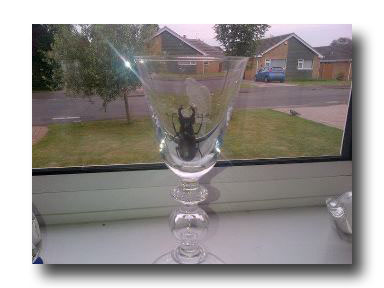 STAG-GERED to see this on the window- sill! An absolute mystery how it got there.Any theories?It certainly wasn't STAGed, evidenced by the reaction of those present when it was spotted. It was released in a quiet place in the garden. STAG-GERED to see this on the window- sill! An absolute mystery how it got there.Any theories?It certainly wasn't STAGed, evidenced by the reaction of those present when it was spotted. It was released in a quiet place in the garden.
Photo taken June 2012 on her mobile by Katarina.
|
|
British slugs under threat.
The recent very wet weather has been great for slugs and snails. You might not appreciate them in your garden, and so I won't be surprised if you're not (initially at any rate) concerned about a threat they now face. Apparently a "super" slug from Spain has arrived in this country and is flourishing to the detriment of British ones. It's the Spanish stealth slug, Arionflagellu, which can grow up to 10cm in length.
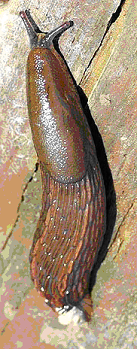 However you may be more concerned when you learn that the Spanish stealth slugs produce four times as many eggs as our native species (400 eggs per slug per year, compared with 100) and so they will be even more of a problem for gardeners. They also bring new diseases and parasites which can kill British slugs. However you may be more concerned when you learn that the Spanish stealth slugs produce four times as many eggs as our native species (400 eggs per slug per year, compared with 100) and so they will be even more of a problem for gardeners. They also bring new diseases and parasites which can kill British slugs.
Slugs are hermaphrodite, having both male and female reproductive organs, but whereas the British ones self-fertilise and are consequently inbred, the Spanish ones cross-fertilise, making them more genetically diverse and more able to cope with disease and other environmental changes at the population level. Consequently it is feared that this one Spanish species may eventually replace all the 30 or so British species.
As well as being a threat to agriculturists and gardeners, they also pose a threat to motorists! They are cannibals and are attracted to the smell of dead slugs (a fact used by some gardeners in their control measures). With the expected increase in the number of slugs from this Spanish invasion, more will be killed on the road, and others will be attracted to feed on them. The mucus and squashed bodies form slicks which may cause accidents!
Elaine Butler (This first appeared in the WDVTA newsletter)
|
|
|
2012 Dorothy Morley Conservation Awards
Congratulations to the winners:
1st Prize (£1000) Make Space for Life
Runners Up Prize (£500) Friends of Wargrave Chalk Pit
The Earley Environmental Group were Highly Recommended and the judges' comments were very complimentary as follows:
"It's really refreshing to see a group striving to make a difference to wildlife across a whole
community. Earley Environmental Group have also forged a great relationship with the local council and are able to influence them to adjust management regimes in and around Earley, which is no mean feat! The judges were also impressed by EEG's willingness to experiment with areas such as the three pilot wildflower beds, which have the potential to be rolled out across the whole of Earley. The group's long-term ambition, to see the roadside verge protected as an LNR, demonstrates their commitment to improving Earley for wildlife, and BBOWT commends the group for having such a positive vision for the place they live in."
|
|
|
WILDFLOWER BEDS IN EARLEY
The commendation above mentions the creation of wildflower beds.
The Instow Road scallops have bloomed beautifully (see below).
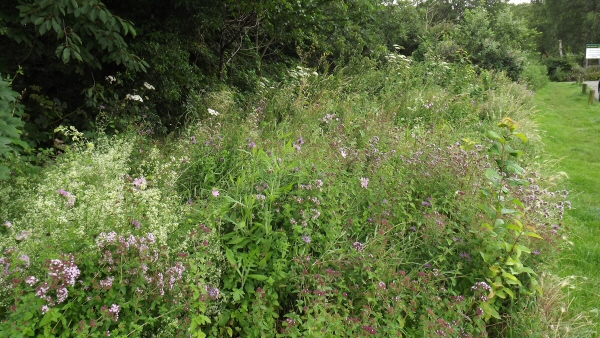
Left, in the foreground, our native marjoram, Origanum vulgare, is prominent, "exceedingly well known to all" said Gerard. It was something of a cure-all. Marjoram tea was thought to help with health problems such as indigestion, earache, cough, dropsy, bladder trouble to name a few. The New Englanders cultivated it for this valuable tea. For a real wildflower treat click here to see lists of two wildflower surveys undertaken by Renee Grayer in Maiden Erlegh Reserve, including Instow Road. You can see a picture of each flower by clicking on its name.
|
|
The Green Fair was the usual huge success, and very well attended by approximately 1000 visitors. Entries for the EEG Squirrel quiz were put in a draw for a copy of Bill Oddie's How to Watch Wildlife. The winner was Jeremy Jones.
|
|
GOINGS ON IN MAIDEN ERLEGH NATURE RESERVE
|
 We had our usual good turnout for the annual Bug Hunt on August 8th, sixteen youngsters plus their enthusiastic mums. Alan Broodbank organised and presented it, sharing his extensive knowledge and enthusiasm, possibly creating an interest for life in some of those participating. First activity was collecting bugs, then inspecting them in the microscope and, finally, Alan released moths collected overnight in a moth trap. The children (and mums) were very well-behaved; it was a good experience for all, thanks to the work put in by Alan. We had our usual good turnout for the annual Bug Hunt on August 8th, sixteen youngsters plus their enthusiastic mums. Alan Broodbank organised and presented it, sharing his extensive knowledge and enthusiasm, possibly creating an interest for life in some of those participating. First activity was collecting bugs, then inspecting them in the microscope and, finally, Alan released moths collected overnight in a moth trap. The children (and mums) were very well-behaved; it was a good experience for all, thanks to the work put in by Alan.
Entomologists: Owen, Zach, Skye, Johnnie, Rachel, Michael, Rajan, Ameya, Abigail, Nasser, Lilly-Mai, Dylan, Honor, Charlotte, Laura and Lottie.
|
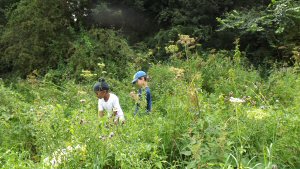 |
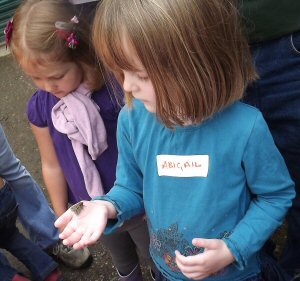 |
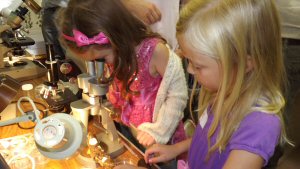 |
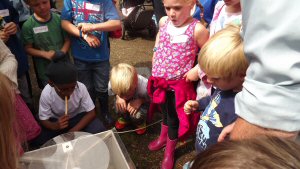 |
|
|
RECYCLING MATTERS
An initiative launched in 2011 called Greenredeem may be coming to our area. The aim is to encourage the public to recycle their bottles and cans when out and about by siting recycling kiosks in public areas. After registering with the scheme you are issued with a reward card which is scanned at a kiosk where you insert your bottles or cans - also scanned. Points are put onto the card, which can be redeemed as money-off and other offers. Grundon, one of the scheme's sponsors, could site kiosks in locations such as the University campus, railway station or shopping centre. Their website says 'the Greenredeem recycling kiosk is a stepping stone, encouraging the evolution of our behavioural trends and attitudes towards the value we place in the cans and bottles we throw away.'
Older readers may be reminded of the returnable deposit on glass bottles, which seems a much simpler system but maybe is not as attractive to users today. Anne Booth
For more information click here.
|
|
CLIMATE CHANGE IS STILL ON THE AGENDA
|
|
Strategic Thinking
Reading Borough Council has a Climate Change Strategy running until 2013 and Reading Climate Change Partnership is in the process of revising it to cover the period to 2020.
Many interesting ideas are being discussed in an on-line forum.
The process is split into eight 'Themes': Adaptation; Built and Natural
Environments; Communication and Working in Partnership; Education and
Behaviour Change; Energy and Waste; Localism and Community; Purchasing,
Consumption and Supply; and Transport.
Wokingham already has a 'Sustainable Environment Strategy 2010 to 2020'developed by the 'Wokingham Sustainable Environment and Climate Change
Partnership' (a subgroup of Wokingham Borough Strategic Partnership).
The Wokingham strategy covers both general environmental and climate change issues and has an action plan running to 2013. It says:
"We will have succeeded, if by 2013:
- We are all better prepared for extreme weather events, particularly flooding
- The Borough generates at least 10% of its energy from renewable sources
- Water use has been reduced to 135 litres per person per day
- Sustainable procurement practices are demonstrated by the Council, its partners and local businesses
- The Wokingham economy develops into a leading-edge area for green technology ".
It would be good to find out how the actions are progressing and compare Wokingham's strategy with the proposals that emerge for Reading.
John Booth.
"Visit the GREN website - www.gren.org.uk - for a directory of many local environmental and wildlife groups, including EEG, and listings of current events and environmental news."
|
|
SOBERING STATISTICS
When The Population Bomb (P.R.Erleich) was published in 1971 the global population was 3.5 billion people. The population now exceeds 7 billion (source: Population Matters magazine 21.8.12).
|
|

|
|
A taster of a future article by John Booth: On his recent retirement he had the brilliant idea of asking for a 'trail camera'as a present. He wanted to find out what unknown visitors came to the garden. The camera even records temperature, date and time taken. Below are a couple of the results.
|
DAWN RAID
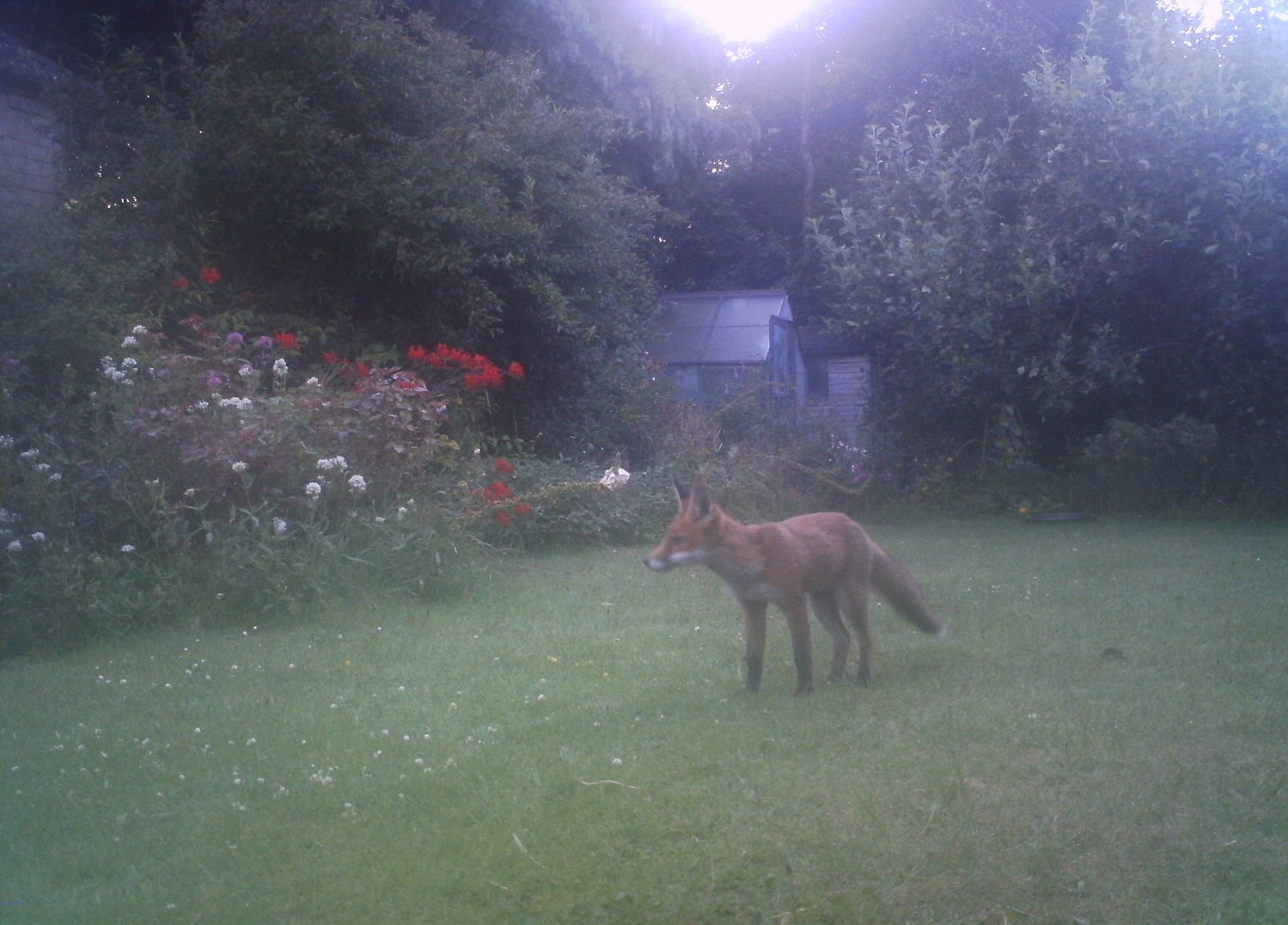
|

INFRA-RED-EYE
|
|
Read John's full article in the December newsletter.
|
|
NEWS FROM BEYOND EARLEY
Bee problems: It is now acknowledged that world bees are in real trouble. It's in everyone's interest to keep a healthy population of bees as, apart from the pleasure of seeing and hearing them, they are essential pollinators for much of our food. Oilseed rape, increasingly grown by farmers, covers around 12% of arable farmland. The seeds are dressed in a coating of neonicotinoid pesticide, residues of which are found in pollen and nectar, and may cause an 85% reduction in queen production (Stirling University). The Bumblebee Conservation Trust is calling for a reassessment of the risk posed by these pesticides and a review of the risk assessment process which deemed them to be safe. (Source: Buzzword, BBCT Summer newsletter 2012). Now we hear that the bad weather this year has badly affected our bees and the honey production will be much depleted.
|
EARLEY WILDLIFE SIGHTINGS AND GARDEN SURVEYS
Our garden survey news from Gillian and Margaret for July:
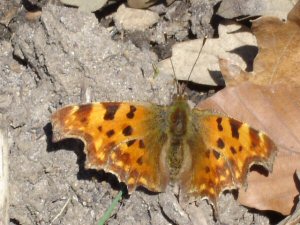 Gillian noted July to be a quiet month, but also added, 'At last some butterflies'. These made their appearance toward the end of July and included comma (right) on shrubs, holly blue, small white, and gatekeeper (on white daisies).
Gillian noted July to be a quiet month, but also added, 'At last some butterflies'. These made their appearance toward the end of July and included comma (right) on shrubs, holly blue, small white, and gatekeeper (on white daisies).
Margaret was lucky to see, among the usual garden visitors, long-tailed tit (12), coaltit (1), dunnock (5) and song thrush (2). The song thrush has a preference for small gardens. Hard to believe that before the First World War it was commoner than the blackbird (imagine the sound of its song then). Its numbers have fallen drastically, reasons for which are hard to explain, although increased predators or not enough food (perhaps hedgerow removal, and effects of herbicide and pesticide) may contribute. (Source: The Secret Lives of Garden Birds, Dominic Couzens).
|
LOCAL FORTHCOMING EVENTS 2012
Monday, 10th September. A repeat of the successful talk given by Brian Clewes on Red Kites. 19.30 to 21.30, Oracle Corporation Building. To find the venue in Oracle Building 550, please enter Thames Valley Park off the last roundabout at the very end of the 329M. Proceed to the next roundabout (TVP Security Lodge) and take the second exit. At the next roundabout take the third exit and enter the Oracle campus. Building 550 is the first building on the right. Enter the car park, and park adjacent to the building. Follow the signs and enter the building via the main entrance at the front. The restaurant is located on the ground floor. Numbers are limited so arrive in good time.
Saturday, 29th September. Leaf Miners at Dinton Pastures, with Ian Simms. 10.00 to 13.00. Joint meeting with Berkshire Moth Group looking for various leaf miners at Dinton. In addition we may be able to see some of the collection of the British Entomological and Natural History Society. Meet in the main car park. (Charges apply).
Saturday, 6th October. Mosses of the University Campus. 14.30 to 17.00. Walk led by Dr. Sean O'Leary. A quick look at the Harris Garden (if open) before heading round the lake, via The Wilderness, to see a good variety of common species. Meet at Pepper Lane Entrance, University of Reading.
Wednesday, 28th November. Population Matters: Towards the next 100 years. 19.30 to 21.30. A talk by Roger Lloyd.This talk aims to look closer at population growth and the implications of a rising population; examine the resources needed to sustain our population, both on a world scale and national scale; identify some of the problems we must face, including some of the worst impacts; project into the future and look at the best and worst outcomes. Suggest possible solutions. Venue: Function Room, Maiden Place Community Centre, off Kilnsea Drive.
|
|
Bits and pieces
EASI (Earley Adopt-a-Street Initiative) would like more volunteers. Help keep your street clear of litter. Everything provided. . Phone Peter Soul, 0118 9264997 or email
We need some new blood! Can you offer active help to the Group? If so, phone 0118 962 0004 or go to the website. We would welcome more member involvement. If you have no expertise and would like to get involved, you may be able to give practical help. Perhaps help with distributing the newsletter hard copies, or maybe you have graphic design skills (for occasional posters, leaflets), computer skills, any other skills to offer. Do your bit for the environment.
Join the EEG Yahoo Group and post your sightings and messages. You’ll find a link to Yahoo on our website.
EEG Committee Members can be found on www.earleyenvironmentalgroup.co.uk under Contacts, or phone 0118 962 0004
For Wildlife Survey Forms, go to the website or phone Earley Town Council 0118 986 8995
Comments or contributions to the newsletter to: the Editor or 2 Reeds Avenue, Earley, RG6 5SR. We would welcome short contributions from members to the newsletter.
If you know anyone who would like to join EEG, membership forms are available from Earley Town Council, 0118 986 8995, on the website under Downloads , or send an e-mail to the Membership Secretary. Please inform Liz if you intend to change e-mail or address at 50 Kenton Rd, Earley RG6 7LG, or send her an e-mail.
|
SUPPORT YOUR LOCAL SHOPS
The True Food Co-op, Silverdale Centre :There is now a True Food Co-op operating in Earley, their most successful market. Their mission is to take low cost organic food out to the people, bypassing the supermarkets which charge a lot for organics They hold markets at the Silverdale Centre on Fridays, 5 to 8. 15 pm. They have a website giving dates www.truefood.coop
Pet Fayre 9 Maiden Lane Centre Lower Earley : A small independent shop, with bird feeders of all kinds, a variety of bird feed, large bags of which the shop is willing to deliver locally, or pick it up in your car from the back of the shop, tel 0118 9266512, e-mail sales@petfayre-reading.co.uk or go on the comprehensive website www.petfayre-reading.co.uk
|
|
Thanks to ORACLE Corporation for reproducing our newsletter on recycled paper. Oracle is the world's second largest software company, situated at Thames Valley Business Park in Earley. Oracle UK adheres to the ISO14001 Environment Standard which confirms Oracle has considered and acted upon its environmental impact. As part of Oracle’s corporate social responsibility they support a number of local groups, including us. They have given us valuable support in reproducing the hard copies of our newsletter in colour, as well as printing posters and membership leaflets for us to distribute to libraries, schools etc. |
|